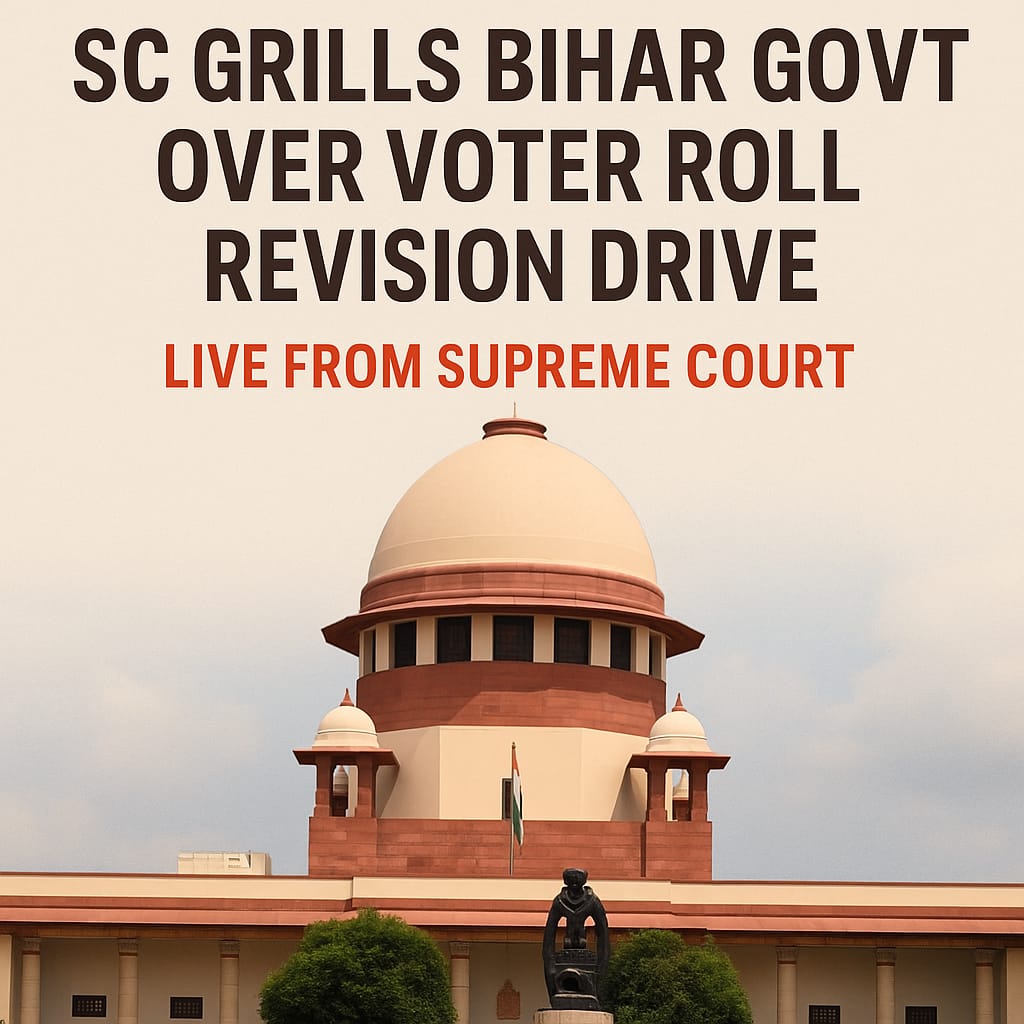Introduction
The Supreme Court of India on Friday raised questions over the Bihar government’s disputed post voter list inspection and The Supreme Court has brought the issue to the national level due to the arbitrary deletion of names and lack of monitoring by the Election Commission.
The Key Concern
The Bihar Government revised the electoral roll in various districts and stated its purpose as being to delete the names from the rolls of those who are not eligible to vote.However, civil activists, opposition parties and affected citizens have claimed that the work was done without the permission of the ECI and they are constitutionally entitled to do so.
The petitioners say that names of thousands of people have been removed from the list, mostly those who belong to the backward classes and those who fall in the category of minorities.
Courtroom Highlights
The Supreme Court, headed by Chief Justice D.Y. Chandrachud, expressed concern over the lack of transparency in updating the voter list.The court said that voter list is very important for democracy and no one’s name is removed from it without due process. The court made this request and sought clarification as to whether the work of revision of the voter list is in the hands of the Election Commission of India or the State Authority so that its proper investigation can be done.
“The right to vote is a constitutional right. You can’t simply delete names based on bureaucratic assumptions,” remarked Justice Chandrachud.
Petitioners’ Claims
Senior advocate Kapil Sibal, appearing for the petitioner, found that names of thousands of people had been deleted from the voter list in districts like Patna, Gaya and Darbhanga. He accused the state machinery of “systematic disenfranchisement” under the garb of revision.
Entire communities have been affected without notice or verification. This is unconstitutional and dangerous,” Sibal said.
The petitioners added that only the Election Commission of India has the power to do voter revision and amendment in it.State government agencies have no authority in this.
Bihar Government’s Stand
The Bihar government went on the defensive and said that the voter revision was only a part of precautionary measures before the elections to find out who is eligible and who is ineligible and the senior advocate of the state government said that the officials have no fault in this. They have only followed the guidelines.
> “This was not an attempt to disenfranchise, but to streamline. Any voter whose name is removed can appeal through the proper channels,” the government stated.
However, when asked about the role of the Election Commission of India, the answer was more clear, raising further doubts in the court.
ECI’s Position Under Scrutiny
Among the questions raised were whether the Election Commission has the authority or not. According to the Representation of the People Act, 1950, and relevant constitutional provisions, it is clearly written in it that the Election Commission of India has the full authority to revise the voting and bring amendments in it.
If the court finds that there is no involvement of ECI in the voter revision then the entire revision can be declared unvalidated and unconstitutional.
The court has now sought answers from the Election Commission of India and has stated its position on whether it had revised the Bihar voter rolls and whether it had monitored it.
The Consequences
This matter becomes a very important issue in election matters in India and also becomes an important issue for voter revision in other states like Bihar.
Legal experts believe the case should be settled on whether the state government should be allowed to interfere with the voters’ list Or how to do the reflection? At its core, the case is about trust in democracy and whether bureaucratic actions are undermining the rights of citizens.
Conclusion
The Supreme Court has given time till next week to the Election Commission to respond. Adding to this the bench said that no State can desire constitutional safeguards in the name of administrative efficiency.
As the legal battle progresses, one thing is clear: The court is not simply evaluating the state’s administrative actions. But it is also translating the democratic processes and protecting the rights of every citizen.Because every citizen has the right to vote.
And it is also important to know who is eligible to vote and who is ineligible?
About the Author
Sahil is a dedicated BBA LL.B. (Hons.) 3rd-year law student at Maharishi Markandeshwar (Deemed to be University). With a keen interest in legal research, current affairs, and judicial developments, Sahil consistently explores the intersections of law, governance, and public policy. He aspires to contribute meaningfully to the legal fraternity through writing, advocacy, and continuous learning.

